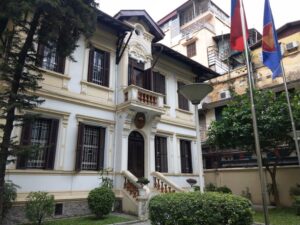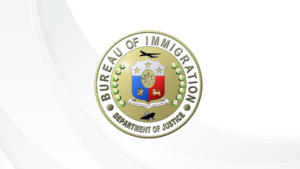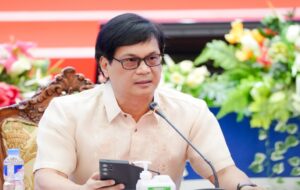Thirty-two years since its establishment in 1992 via Republic Act 7227 or the Bases Conversion and Development Act of 1992, the Subic Bay Metropolitan Authority (SBMA) has become an economic powerhouse and a major employment generator, creating thousands of jobs in various fields, including maritime, logistics, tourism, and manufacturing. The Subic Bay Freeport Zone (SBFZ) has drawn in close to 1,800 local and foreign companies, creating a vibrant ecosystem centered on economic activity.
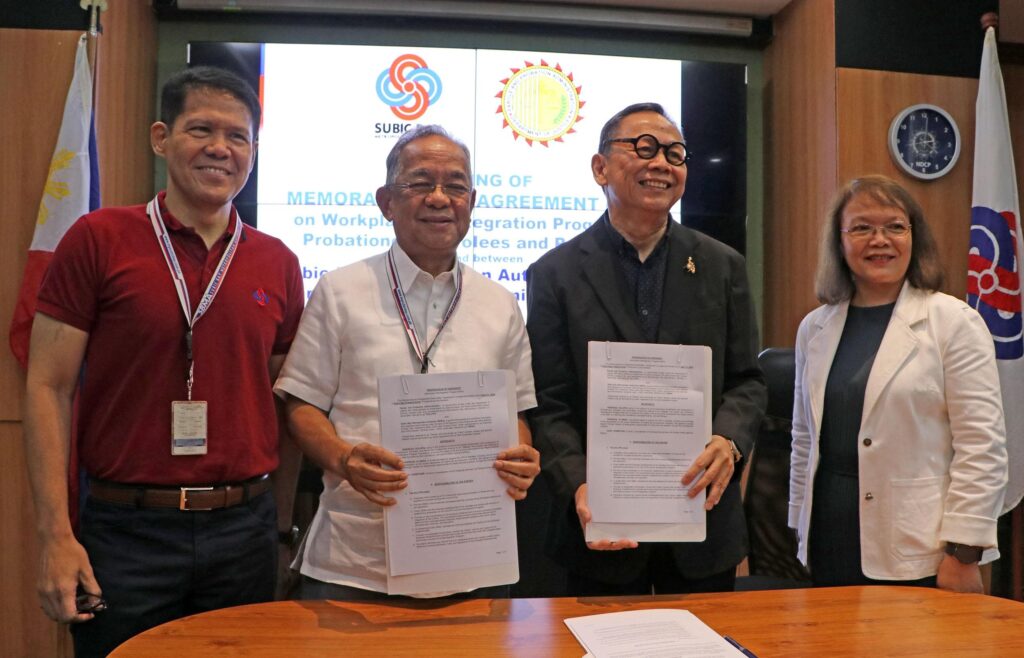
In recent years, the SBMA continued to expand its programs to create more labor opportunities and support workforce development. Among its notable initiatives was the promotion of inclusive employment, such as its partnership with the Department of Justice—Parole and Probation Administration (DOJ-PPA) to reintegrate parolees, probationers, and pardonees into the workforce. By collaborating with companies in the Freeport Zone, the SBMA helped provide second chances to individuals looking to rebuild their lives.
PBBM’S Campaign for Second Chances
President Ferdinand Marcos Jr. has vowed to change the narrative of PDLs who fail to find job opportunities after serving their sentence. He has directed the DOJ to release more PDLs who are qualified for parole to ease up congestion in the country’s correctional facilities.
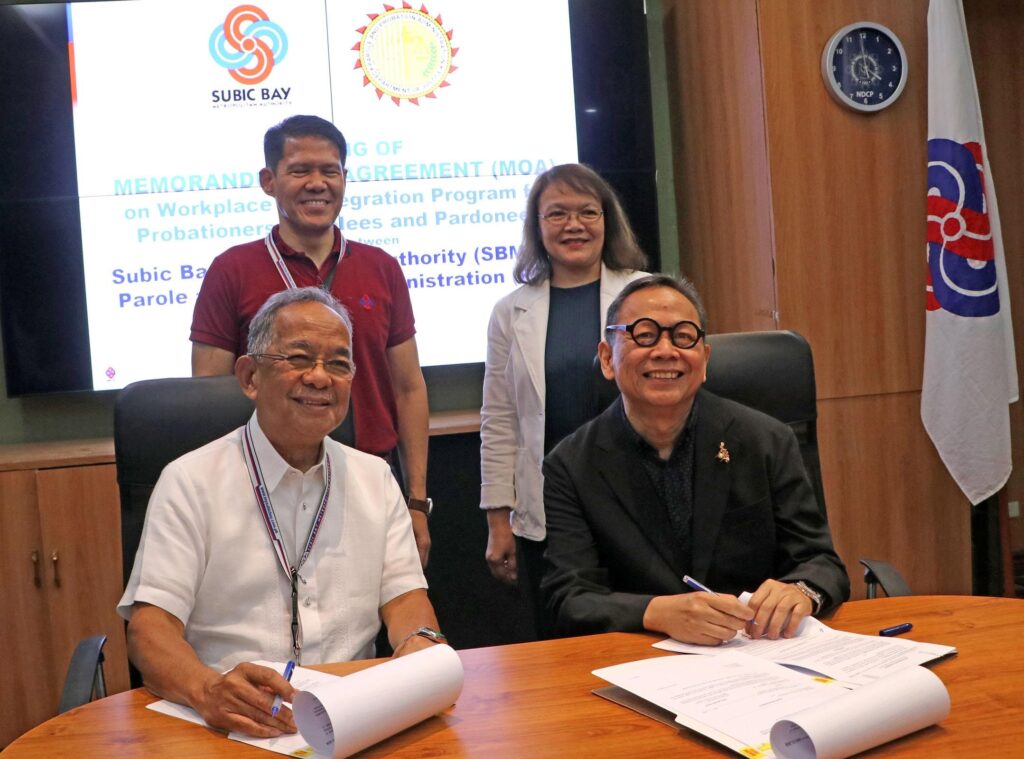
In compliance with the President’s directive, the Philippine Development Plan 2023-2028 has included provisions to provide livelihood opportunities and trainings for PDLs. The government will also provide tax incentives or other non-monetary incentives and recognition to employers and business establishments that will provide capacity-building, livelihood, or employment, as well as entrepreneurial opportunities to PDL. It will also conduct a study to determine whether expungement of criminal records adopted in other jurisdictions is viable to remove the stigma associated with incarceration.
In a recent Cabinet meeting, Pres. Marcos recalled that during his time as governor of Ilocos Norte, he discovered that many were sent to prison because they could not afford a lawyer. “Wala silang magaling na abogado. That is why we are in favor now to release many of them,” he said.
Pres. Marcos said PDLs deserve support in rejoining their families and society. “They just needed representation to set them free,” he said.
The president has also directed member agencies of the Justice Sector Coordinating Council to streamline and digitalize records and services to hasten jail decongestion. “By embracing technology and innovative practices, we can enhance our efficiency, reduce delays, and ensure swift and fair legal proceedings,” the president said.
The Philippine Development Plan 2023-2028 also called for a law that will unify the holistic reintegration strategy of formerly incarcerated offenders and involving a multi-disciplinary program that will ensure the successful rehabilitation of convicted offenders. The program will be directed toward improving the offenders’ behaviors, skills, mental health, social functioning, and access to education and employment.
As of October 2024, the Bureau of Corrections (BuCor) has released a total of 16,657 PDLs under the Marcos administration. In March of this year, the BuCor released 783 PDLs. In February, it released 706 PDLs from its different prisons and penal farms.
The workforce reintegration program was designed to address the challenges faced by persons deprived of liberty, or PDLs, as they re-enter society.
‘Being a parolee, probationer, or pardonee often subjects individuals to societal judgment and exclusion. However, they deserve the opportunity to work, provide for their families, and reclaim their dignity,” SBMA Chair Eduardo Jose Alino said as he lauded the program.
SBMA’s Labor Department manager, Atty. Melvin Varias said his unit will continue to find more ways to ensure that the Freeport Zone comes up with more innovative and inclusive hiring programs.
The word “ex-convict” used to automatically terminate the job application process for people who served a jail term. They were even shunned by people in the community where they used to live when they are released from jail.
But now, for some men and women who had run afoul of the law, they are now welcomed as “clients” of the SBMA.
SBMA Chairman and Administrator Eduardo Jose L. Aliño said the MoA provides a “silver lining” for those who seek to reform their lives after incarceration. “If you are a parolee, probationer, or pardonee, some people will view you for your past actions and not what you are trying to become,” Aliño said.
Aliño added that those who were found guilty of a crime were looked down on because of the social stigma from their past actions. “I honestly think though, that they should not be denied their right to work and provide financial support to their families,” he said.
“Being a parolee, probationer, or pardonee often subjects individuals to societal judgment and exclusion,” Aliño remarked. “However, they deserve the opportunity to work, provide for their families, and reclaim their dignity.”
According to the general conditions of the agreement, the SBMA and the PPA will jointly develop a workplace reintegration program for these clients that specifies its objectives and includes a register of the knowledge, skills, and competencies that these persons already have or acquired for skills-matching.
PDLs as Clients
PPA Administrator Atty. Bienvenido O. Benitez Jr. expressed gratitude to the SBMA for being the first government-owned and controlled corporation to support the PPA’s workplace reintegration plan.
Benitez disclosed that under the MoA, parolees, probationers and pardonees are referred to as “clients” to lessen the stigma associated with being a former person deprived of liberty. Under the agreement, the SBMA and PPA will map out a workplace reintegration program that will match the skills and competencies of clients with potential employers.
He added that the program not only creates employment opportunities but also restores hope and stability to former PDLs and their families. For many parolees and probationers, life outside confinement had been as cruel as their lives behind bars. Despite having paid their dues for their mistakes, they find themselves faced with judgment and discrimination when they rejoin society.
Varias explained that as early as October 2024, parolees have already been endorsed to the SBMA’s Labor Department. This will enable the organization to assess the skills of the PDLs. He said this will increase the employment opportunities in the freeport while making strides towards a more inclusive and equitable workplace.
Training the “Clients”
The PDLs will be given trainings to make them suitable for companies that need manpower. Currently, the shortlisting of companies is also in the works. Some of the companies who have signed up for the initiative include Pencil and Stationery Products Manufacturers Inc., Fusion Integrated Service Coop, YZ Manpower Services, Subic Asia Pacific Marine Resources, Buchan Global Services Corp., Yokowo Manufacturing of the Philippines, Inc., and several others.
Atty. Ramon O. Agregado, SBMA’s Senior Deputy Administrator for Support Services said the organization is fully committed to the program. “We will facilitate the endorsement of potential and qualified clients through a Register of Eligibles (ROE) to Subic Bay Freeport Zone locator companies under the Workplace Reintegration Program,” he said.
The SBMA will provide regular updates to the PPA and work closely with the agency to ensure the program’s objectives are met.
Atty. Benitez praised the SBMA for its “people-centered philosophy” and for being the first government-owned and controlled corporation to support the initiative.
The Workplace Reintegration Program (WRP) of the SBMA is a work in progress and a continuing project for as long as the PDLs avail themselves of the system, meet the qualification and requirements and pass the training programs.
The employment will not constitute an employee-employer relationship between the SBMA and the clients, but shall be a partnership or joint venture between the agency and the DOJ-PPA. As the MOA also provides, the clients shall also be personally responsible for any and all liabilities, or injuries to himself or to property/ies or persons attributable to his own fault or negligence while at work.
Looking ahead, Atty. Benitez shared plans to expand the initiative with Clark Development Corporation (CDC) and John Hay Management Corporation (JHMC).
Employment, Education and Training
On top of the WRP, the SBMA likewise provides education opportunities with their employees or their relatives.
For instance, Edward Michael Santiago’s father was also a volunteer when the Americans left the former naval base. His mother now works at the media department of the SBMA.
In 2015, Santiago, although already gainfully employed, still wanted to obtain a college degree.
“I prayed that I could find a way to finish college. It was my mother who told me that SBMA offers scholarships for employees. When I heard that, I grabbed the opportunity,” he said.
In 2022, the Technical Education and Skills Development Authority (TESDA) and the SBMA signed an agreement to build a training institution in the Freeport Zone. Through this, employees across Subic and neighboring towns were given training opportunities in key sectors such as agriculture, construction, automotive, and land transportation.
SBMA as an Economic Powerhouse
Since its inception, SBMA has evolved into a dynamic hub of opportunities, fostering progress, not only for the SBFZ but also for thousands of Filipinos who have found employment in the former American facility over the years.
One of the reasons for SBMA’s success is its ability to attract global investors by offering world-class infrastructure, tax incentives, and a highly skilled workforce. Major corporations including shipbuilders, manufacturing firms, and logistics providers have set up operations in the freeport zone, employing thousands of Filipinos and contributing significantly to the national economy.
In 2024, Sanyo Denki formally opened its Phase 4 expansion costing PhP 2.3 billion at the Subic
The Subic Workforce of the Future
Today, the SBMA remains as a symbol of hope, resilience, and opportunity. With a focus on sustainability and innovation, the authority is working to attract more green industries, technology-based companies, and other emerging sectors to ensure that the SBFZ remains competitive in the global market.
Through partnerships with educational institutions, the SBMA will invest in the next generation of workers, regularly updating their skills with trainings aligned to the needs and standards of modern industries.
Since 2022, the effort to construct high-quality capability building facilities to further equip Filipino workers with the necessary skills has been aligned with President Ferdinand Marcos Jr.’s “Build Better, More” program. With the expected 194 big-ticket projects for business and economic expansion, more jobs and higher salaries will be available for workers.
A Lasting Impact From its historic beginnings as a colonial naval base to its transformation into a thriving economic hub, the SBMA has shown what is possible when a community unites with a shared vision. The legacy of the volunteers who helped shape its future continue to inspire as the SBMA now provides opportunities for every Filipino who walks through its gates. With its commitment to innovation, inclusivity and sustainable development, the SBMA will remain as a cornerstone of the Philippine economy for generations to come.

